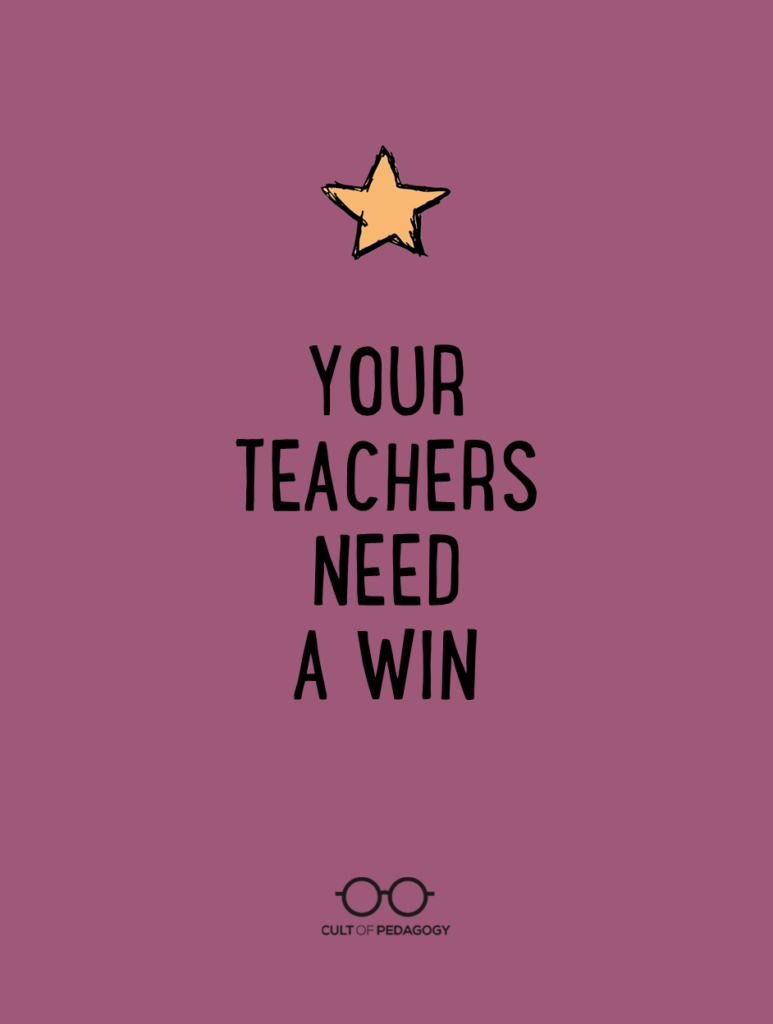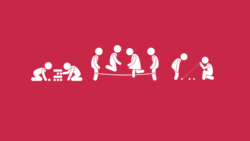
Listen to this post as a podcast:
Sponsored by NoRedInk and The Modern Classrooms Project
I was having a conversation this morning with a teacher I’m very close to, someone who trusts me enough to be honest with me, and who does it in a way that is loving and generous. She was talking about how my website and podcast sometimes make her feel like she’s not doing enough, she’s doing it all wrong, her teaching is never quite good enough. And that makes her feel like crap, because all she ever does is work, to the detriment of her physical health, her mental health, and her relationships.
To be fair, I’m not the only one making her feel this way — she gets this message from professional development, from people who write books and articles and create media directed at teachers, and from her school leadership. None of us are sending that message in quite those words. Instead, we are offering up ideas, strategies, new tools, fresh ways to fine-tune and improve and grow and it is all so well-intended, but to an overwhelmed teacher who is trying desperately to just keep their head above water, it’s like trying to drink from a firehose. The message ends up getting reduced down to one thing: DO MORE.
She compared it to Pinterest, how you might be doing something like planning a baby shower for a friend, and you’ll do some research and get a cool plan in place and buy all the things, and then you look at Pinterest and it’s tile after tile of beautifully curated images and all these amazing ideas that you didn’t do but they’re all great ideas but you don’t have the time or the budget to do them and there’s too many choices… and you look back at your baby shower stuff, and the shower is tomorrow, and you go, wow, this shower is gonna be terrible. I’m terrible.
And when I look back over the ideas I’ve put out over the years, I can see how it could make a teacher feel that way. While I fully believe it’s all good, useful stuff, I get how it could be overwhelming. It has always been my hope that it would be consumed on an as-needed basis, when people have the time and space for it, when they have a problem they want to solve. And maybe if teachers had total control over their time and their craft, it would work that way, but they don’t. Administrators also consume this stuff. And they want their teachers to implement it. And far too often, they want them to implement it NOW. This ignores all of the good things teachers are already doing. And so even teachers who manage to avoid that Pinterest-y comparison often have it placed in their laps anyway.
So right now I want to pause my usual stream of ideas and suggestions and talk to those administrators, to principals and superintendents and instructional coaches and anyone else in a position to tell teachers how to do their jobs. I have no new strategies or tools or books to share with you this week. Nothing new to implement.
My only message for you is that your teachers need a win, and they need it now.
When a person only receives criticism — direct or implied — and no praise, they’re drained of motivation. And this is especially true when that person is doing something difficult. Something like teaching. Without any feedback about what they’re doing right, it becomes easier and easier to give up.
The opposite is also true. Sometimes even in the toughest situations, the smallest bit of praise can give a person enough confidence, enough of a dopamine hit, to keep going and keep trying.
But to work, the praise needs to be specific. Generic praise does no good at all.
I had a principal one time tell me I was one of his best teachers, and when I gently I asked him how he knew that when he never came to my classroom, he thought about it and said he just knew, because no parents ever called to complain. I really liked him as a person, but I’m sorry, that compliment didn’t mean anything to me. I would have much rather had him watch me teach for 10 minutes and tell me one or two things I did that he thought were especially effective. Even if he only gave me that feedback once a year, it would do more for me as a teacher than what he did instead. And it would have motivated me to work even harder.
So this is my ask of you as an administrator: Choose 10 teachers on your staff and make it a goal to give each of them one piece of specific, positive feedback this week. For some, you might only need to think about what you’ve noticed during your past observations of them. For others, you might need to arrange a short classroom visit — make sure the teacher knows ahead of time that you will ONLY be looking for things to compliment them on. Even better would be to ask them to choose a time when they’re doing something they think you’d like to see.
If you’re short on ideas, here are a few things you might compliment them on:
- Relationships and rapport with students: Are they tuned in to their students’ moods? Do they seem to know their students well? Do their students seem to be relaxed? Do students take risks and seem comfortable asking for help? Do students show signs of liking and trusting their teacher?
- Decision-making: Are they good at noticing when a student is struggling with material? Are they able to course-correct when something goes wrong? Do they have a good sense for when more examples are needed, when some students are getting restless, or when it’s time to switch things up?
- Clarity and delivery: Are they good at explaining things, giving instructions, coming up with relevant examples? Is their delivery engaging, warm, entertaining, relatable? Do they provide adequate wait time or ensure that many students are included in the learning? Do they seem excited about the thing they’re teaching?
- Classroom management and logistics: Have they set up any systems in the classroom that make it run well? Do you notice them modeling behaviors that students might emulate? Are there any signs that students have been given the tools they need to manage some of their own learning independently?
- Lesson planning: Do they come up with interesting activities to teach their content? Do they ask challenging questions? Are they good at managing time so that activities finish on time and students are let go when they should be? Do they make good use of unexpected leftover time?
- Design: Is there anything about the design of their instructional materials, seating arrangement, or classroom that makes them especially effective or inviting?
Please, please, please do not mistake this for a checklist that you should use to suggest areas for improvement. It’s not a walk-through sheet. And this list could be three times this long. Every teacher is good at something, and they need to hear about it — the more specific, the better.
After this week is over, pick 10 more teachers and repeat the process. If 10 was too much the first week, just do five. Or two. Or however many you can handle. My guess is that once you’ve done just a few, you’re going to want to do more, and it’s going to get easier. Because the person receiving the compliment isn’t the only one who gets a dopamine hit. The giver gets one too. On top of all that, this process takes very little time and it’s totally free. And in education, we like fast and free.
If you are not an administrator, you can take this small challenge into your own relationships — with your students, your colleagues, your own kids, your partners and family members and friends. And your administrator — they need it too, probably more than you realize. There is not a person alive who wouldn’t benefit from a genuine, specific compliment.
In 2016, I posted this incredible video about a teacher, Stephanie MacArthur, who did an activity with her students called the Compliments Project, where every student took a turn sitting at the front of her classroom while their peers wrote compliments on the board behind them. When they finished, the student would stand up and read the compliments in front of everyone, and when I tell you it is emotional — you just have to watch it. It’s absolutely worth five minutes of your time, and it’s a beautiful illustration of just how much we all need more praise in our life.
So that’s it for today. A pause in the firehose of ideas and suggestions and a request that you give some genuine compliments this week to the people in your life who need it. If you take me up on it, and it goes well, I would love to have you tell me about it below.
Thanks so much for the work you do.
Join our mailing list and get weekly tips, tools, and inspiration that will make your teaching more effective and fun. You’ll get access to our members-only library of free downloads, including 20 Ways to Cut Your Grading Time in Half, the e-booklet that has helped thousands of teachers save time on grading. Over 50,000 teachers have already joined—come on in.





Thank you for the “your teachers need a win” ep — so nailed it. I’ve shared it to our admin and supe. Well said and perfectly timed and needed more than anything else right now. Be well. Mike
Thanks so much, Mike. This was a real last-minute post for me, so I’m happy to know I got it right.
Jenn,
Thank you for being so in touch with what educators are feeling right now. Your podcast provides gentle inspiration, invitations to try new ideas, and I always feel that you have a deep respect for teachers. hopefully more teachers will feel seen and appreciated by admin after they listen to this episode.
Thank you, Christine. I really appreciate this.
Thanks for the win, Jen. ❤️
You are so welcome, Kris. 🙂
Jennifer, you nailed it! I will be spreading this life saving message to my colleagues. Thank you so much for the reminder and the launching pad of ideas.🙏
Wow, this is so refreshing and much needed! There’s always something new to implement, usually without much training, with the expectation that you automatically start using it in class. Not just one strategy or technology, but many. It does feel like it’s never good enough, and I’ve believed it too many times. Thank you for the recognition and the suggestion along with the video! It’s more than enough to lift my spirits!
I’m so glad to hear this, Laura! Thank you!
This is a very timely post. Although it is fairly early in the school year, there is this underlying feel or vibe that presents as a lack of motivation. Thank you for the post, and for resharing the compliments video.
Thanks Nabeela! That video is wonderful; I’m so glad you liked it.
I’m the teacher Jenn talked to, and I appreciate this so much. It is perfect.
I’d like to add one thing, a “yes and” for administrators. I know you’re under tremendous pressure to implement new programs. But if there is any way to put the kibosh on them for one year and let us work on what we’re already doing, just catch our breath, it would cool our exhaustion and rage. I imagine my principal coming to me with some lovely specific feedback, and I feel an apprehensive tension lurking. Because what’s the “but?” Or the “next step?” It’s ingrained in me as a 25-year teacher to expect to hear a new idea that I know I’ll never get to because I’m still doing all the other things, and feeling bad because I already know I’m going to let someone down before I even try. I’m going to be a disappointment because I still have to write 14 college recommendations, set up a lab, and grade all the higher-order assignments that shouldn’t be quick and easy multiple choice. All of these things are hard and intense but I won’t feel accomplished because I had to let things go. I’m awake at 4 am trying to figure out how I’m going to fit ten pounds of things I need to do into a five-pound day. At one point I remembered I’m paying for a membership at the Y and thought, “Oh gosh, exercise! Remember exercise?”
All for what? Why are we doing this? The screws keep tightening. The expectations on us are humanly unsustainable.
The idea that an admin might stop all new initiatives for a full year is so revolutionary. If I could put a head exploding emoji here I would.
And thank you again. XO.
Beautiful message! I just retired after 39 years of teaching and got a bit emotional after reading this. While cleaning out my classroom, I found my “PATS” folder, filled with positive praise notes from administrators and parents. Many were from the longest and most beloved principal, who walked through weekly and always left a small paper note with just a sentence or two. Such a confidence builder!
I love that you had those notes, Katherine! And I’m so glad your admin took the time to do that!
As a writing teacher, my best idea was to use two colors of ink when grading papers..one for specific suggestions (can you use an active verb here?) and one for specific compliments (nice active verb here). Students tended to remember the compliments better…if real and specific.
This meant so much to me! I’ve read countless articles you’ve posted, and I’ve implemented many of your ideas, but I’ve never teared up while engaging in any of your content. Today I did 🙂 Thank you–like, really–thank you.
You are so welcome, Christie. It means a lot to me that this hit right.
Same. Long time listener, first time crier…;) And in the grocery aisle no less!
This is spot on and so timely! I immediately shared this with my administration and instructional coach friends and then started sending compliments to our teachers. ❤️
I love this. If you happen to come back and see this, and you’re willing to share, I would be interested to hear what one of those compliments was.
Jennifer,
When I found your blog a few years back I said, “Yes! A person who gets it.” When people asked me what do teachers need, I would always say, “A high-five; a sincere I appreciate you and here’s why…real, down to earth support.” Money never did it for me because I worked for a “higher cause.” (also I was maxed out on the salary schedule and no matter what I did, the only way to make more money was longevity). When the kids told me, “You are my best teacher,” I would say, “Cool. Thank you. But I need to know why and what I did to help you.” Yes, teachers need a win. Damn, a grand slam! And they need people to really SEE them, not constantly make them do more and more and more till they break. You did a video a while back where you were very saddened by the state of teaching and had no clue where to go next.” This is great. I will tell you this, years ago in the ’90s, people did care. On teachers day, the admin came by and brought us coffee and treats and made a big deal about how important we were. That was the stuff. Since then, we were chiseled down to a PDF that if we wanted to keep, we had to print it out ourselves that basically said a lot of nothing. As the song says, “I have long since retired…” but I am sure glad I stuck to being me (not listening to the complete BS from the experts) and did what was right by the kids. How do I know? I have a student from 1996 stopping by my house to pick up some art work I saved for her; my wife constantly brings home messages (she works at our local bank) from young adults (I taught in their tweens and teens) who are now close to 40 saying (literally in tears) telling my wife I was the only one who listened and helped them. And to this day, I still do. They were going through some really bad stuff, but they are published poets, artists, tattoo shop owners and tap room entrepreneurs. So, yeah, good win. It’s not about the “Xs and 0s” but making kids and their teachers feel like a million dollars no matter what they do. Peace out.
Those relationships are everything, Rick. We can try and try to reach every kid academically, but we’ll never get it to 100%. What we CAN do is be kind and interested in them as people no matter what. And it sounds you did that incredibly well.
This is so needed. I taught in Life Skills classrooms that were everything but teaching skills of life for students with disabilities.
Everything I learned on my own, told me the opposite of what admin would tell me. Take data. Ok, but I need data on the student’s abilities to functionally communicate, not if they know the letter C.
Admin never took the time to really listen. They didn’t give me MY wait time. I didn’t get to gather my thoughts.
The principal would ask why I stayed late every day. She didn’t listen to the answer. Nothing works for everyone. Therefore I needed to individualize. That takes a long time and a lot of energy.
The principal stopped noticing the positive change in behaviors once students moved to my room. Instead she decided, without a special education background, that she and the ass’t principal knew what my students needed.
I quit for good May 6, 2021. I’m good at teaching. I miss my students terribly, but another breakdown caused by admin… I won’t come out the other side.
This is heartbreaking, Patty. I wish it was the first time I heard a story like this, but unfortunately, it’s all too common. It sounds like you were intentional, thoughtful, and attentive as a teacher. I really hope you’re able to bring those gifts to another, more supportive space.
It was so poignant that I teared up in the grocery aisle listening to you describe exactly what I have been guilty of on both sides of the ledger, as a teacher and a principal.
And you did it so gently and so positively. I felt heard and seen as an educator and my heart broke for all of those teachers who see the well-intentioned advice as yet another pile on. You nailed it and kudos to the teacher friend who spoke up and shared with you.
Ironically, my sharing this podcast with others may just add more to their workload… gosh!
This was timely as I was about to do a 3 hour professional learning session with 1st grade teachers the next day. I knew there was a lot of tension and stress because of a new assessment the district chose. As the 1st grade literacy specialist, I work all 1st grade teachers as a group and with a handful of them very closely as a coach. With the handful, I’m in a position to share their wins. With the larger group, it’s harder.
You inspired me to do a group recognition of their many efforts. You have probably heard of the icebreaker, “That’s Me!” where you call something out and if it applies to you, you stand up and say, “That’s Me!” I brainstormed a list of recognitions as teachers stood and said, “That’s Me!”, we all cheered. I even ordered one day delivery of 4 pom poms to add to the cheering. It brought a lot of laughter to the room and smiles. THANK YOU!
Here are a few of the examples (attended an optional pd, worked on the weekend, left your computer in your bag when you got home so you could unwind and spend time with others, took a deep breathe when a student was having a hard time, used a phonics routine so many times that it now feels natural…)
If I hear or get one more email that says, thank you for all you do, Imma do something rash.
Specificity is key. Teenagers do say thank you, but it’s usually in some kind of code: I actually took out this book and started reading it at home, I’ve never cared about what I wrote before, I think we had a good relationship—will you write me a recommendation? And this is all normal and expected.
So it is up to the grownups to be intentional and particular with their praise. Everyone needs to be recognized and appreciated. Teachers are professionals who do an impossible job, and yet we seem to get a lot of negativity sent our way. Our bosses could do a lot by doing so little to combat that.
Yes to all of this. Yes.
Your article came to my attention on the perfect day! Since October is National Principals Month, I shared this with our Leadership team today and gave several specific compliments to them for their effectiveness. Being a school principal, especially without an assistant administrator, is equally challenging to that of a teacher and school leaders need affirmations as well. Thank you for giving us all breathing space to not DO MORE!
Thank you for recognizing what teachers need right now. It is comforting to feel seen and heard. However, when I hear podcasts directed at admin, and I’ve heard several from the various teaching podcasts I follow, I don’t feel I can approach an admin with a podcast or article on how they can improve or what affect their requirements have on teachers. I feel it would be dismissed, or made to mean I am being difficult or disrespectful. I will say my principal, who I have the most interaction with, is approachable and willing to work on solutions to issues. So if I came to her and shared where I am struggling or feeling stress or frustration she would work with me and do what she could to alleviate it. But, a lot of the requirements come from higher up, the assistant superintendent or superintendent. So the principal’s hands are tied. There have been times she has spoken up to them on our behalf and sometimes it makes a change and sometimes not. I find it sad that teachers feel they cannot speak up about their needs or what stress they are feeling. Do any other teachers feel this way?I don’t mean to sound negative or disgruntled, I am just wondering how other teachers feel about this or how they have brought up things with admin, especially superintendent.
Heather, this seems like such a difficult position to be in. If you’re feeling this way, I’m sure that other teachers are, as well! Throughout the comments section, several people have mentioned that they have shared the article with their team or with their administrators. Several administrators have even mentioned how much they appreciated the post. Perhaps you can ease into some conversation by sharing the post with just one or two others who you think would be open to helping find a way to expand the dialogue. I hope this helps!
I’ve had this article open as a tab in my browser since it was released, because it resonated so much with my perception of where we are right now. But might I also add that your STUDENTS need a win right now, too? The amount of pressure, stress, despair, and overwhelm that dominates student life can be crushing. How can we adapt the message of this piece to also think about giving specific and meaningful encouragement to our students?
Hi Liz,
It’s wonderful to hear Jenn’s post had such a strong impact on you, and while I see your point that students need our support and encouragement too, there’s also something to be said for a message written specifically for teachers. We are often passed over in conversations about education, our needs often forgotten, and our hard work taken for granted. It’s my understanding that it was Jenn’s intention to dedicate this post exclusively to us for a reason. Once we are treated better and finally doing better ourselves, we can help our students more effectively and be there for them, too.